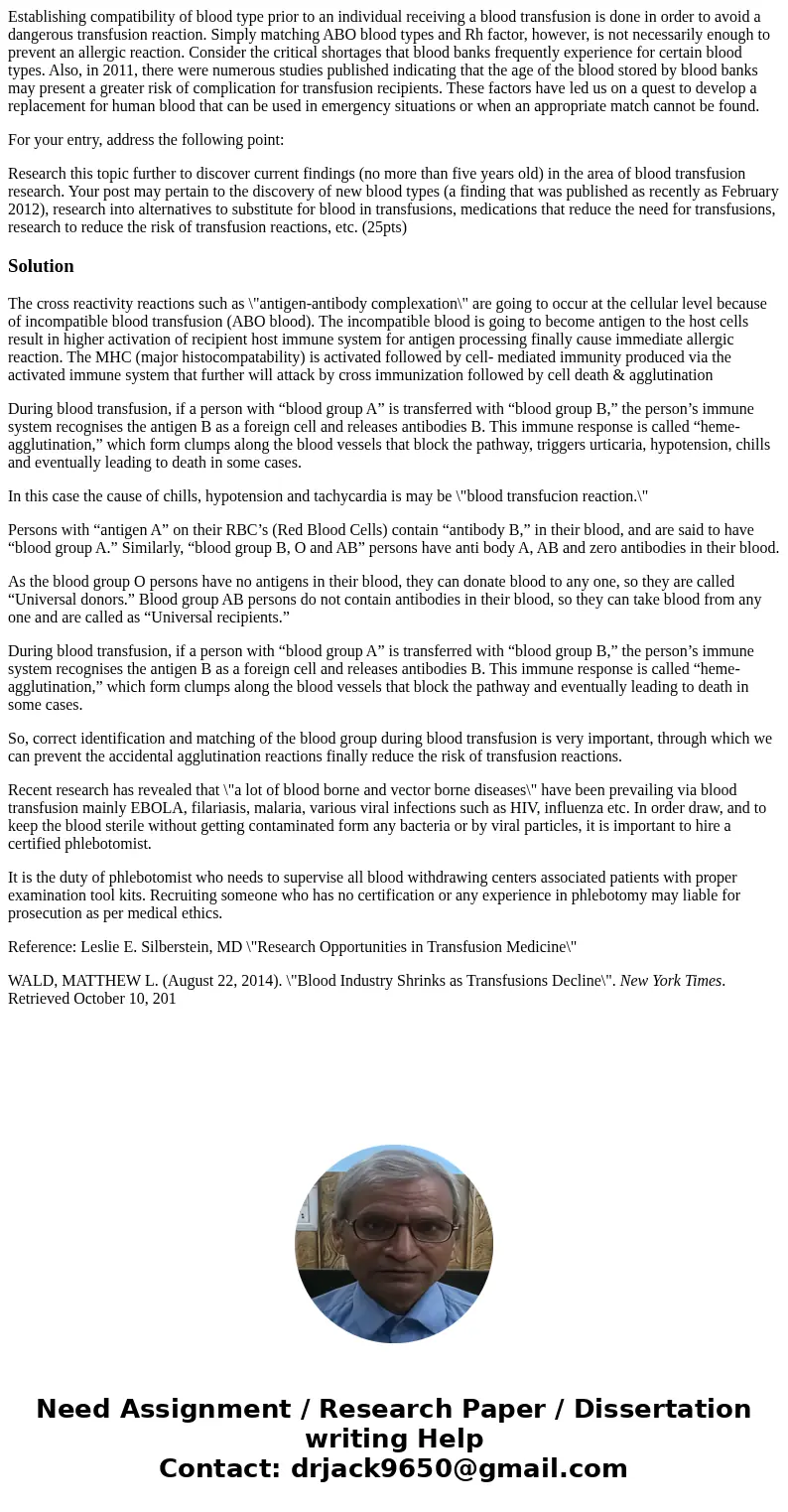Establishing compatibility of blood type prior to an individ
Establishing compatibility of blood type prior to an individual receiving a blood transfusion is done in order to avoid a dangerous transfusion reaction. Simply matching ABO blood types and Rh factor, however, is not necessarily enough to prevent an allergic reaction. Consider the critical shortages that blood banks frequently experience for certain blood types. Also, in 2011, there were numerous studies published indicating that the age of the blood stored by blood banks may present a greater risk of complication for transfusion recipients. These factors have led us on a quest to develop a replacement for human blood that can be used in emergency situations or when an appropriate match cannot be found.
For your entry, address the following point:
Research this topic further to discover current findings (no more than five years old) in the area of blood transfusion research. Your post may pertain to the discovery of new blood types (a finding that was published as recently as February 2012), research into alternatives to substitute for blood in transfusions, medications that reduce the need for transfusions, research to reduce the risk of transfusion reactions, etc. (25pts)
Solution
The cross reactivity reactions such as \"antigen-antibody complexation\" are going to occur at the cellular level because of incompatible blood transfusion (ABO blood). The incompatible blood is going to become antigen to the host cells result in higher activation of recipient host immune system for antigen processing finally cause immediate allergic reaction. The MHC (major histocompatability) is activated followed by cell- mediated immunity produced via the activated immune system that further will attack by cross immunization followed by cell death & agglutination
During blood transfusion, if a person with “blood group A” is transferred with “blood group B,” the person’s immune system recognises the antigen B as a foreign cell and releases antibodies B. This immune response is called “heme-agglutination,” which form clumps along the blood vessels that block the pathway, triggers urticaria, hypotension, chills and eventually leading to death in some cases.
In this case the cause of chills, hypotension and tachycardia is may be \"blood transfucion reaction.\"
Persons with “antigen A” on their RBC’s (Red Blood Cells) contain “antibody B,” in their blood, and are said to have “blood group A.” Similarly, “blood group B, O and AB” persons have anti body A, AB and zero antibodies in their blood.
As the blood group O persons have no antigens in their blood, they can donate blood to any one, so they are called “Universal donors.” Blood group AB persons do not contain antibodies in their blood, so they can take blood from any one and are called as “Universal recipients.”
During blood transfusion, if a person with “blood group A” is transferred with “blood group B,” the person’s immune system recognises the antigen B as a foreign cell and releases antibodies B. This immune response is called “heme-agglutination,” which form clumps along the blood vessels that block the pathway and eventually leading to death in some cases.
So, correct identification and matching of the blood group during blood transfusion is very important, through which we can prevent the accidental agglutination reactions finally reduce the risk of transfusion reactions.
Recent research has revealed that \"a lot of blood borne and vector borne diseases\" have been prevailing via blood transfusion mainly EBOLA, filariasis, malaria, various viral infections such as HIV, influenza etc. In order draw, and to keep the blood sterile without getting contaminated form any bacteria or by viral particles, it is important to hire a certified phlebotomist.
It is the duty of phlebotomist who needs to supervise all blood withdrawing centers associated patients with proper examination tool kits. Recruiting someone who has no certification or any experience in phlebotomy may liable for prosecution as per medical ethics.
Reference: Leslie E. Silberstein, MD \"Research Opportunities in Transfusion Medicine\"
WALD, MATTHEW L. (August 22, 2014). \"Blood Industry Shrinks as Transfusions Decline\". New York Times. Retrieved October 10, 201

 Homework Sourse
Homework Sourse